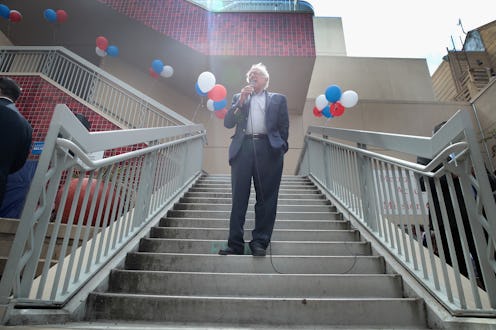News
Bernie As The Nominee Is Not Impossible
The Associated Press stunned social media and news outlets when it announced Monday night that Hillary Clinton is the presumptive presidential nominee of the Democratic Party, with her delegate count at exactly 2,383 — the magic number needed to secure the party's nomination. "Presumptive nominee," however, does not equal a formal nomination. In spite of the lead the former secretary of state has over Sen. Bernie Sanders, there's still a slight chance that Sanders could secure the nomination ahead of the July 25 Democratic National Convention in Philadelphia.
Sanders has repeatedly stated that the nomination will not be sealed until the party's convention. At a campaign stop in Santa Cruz, CA, he claimed that neither candidate will have a majority of "real delegates" by the time the polls close in California and New Jersey. He expressed as similar sentiment in a statement released after the AP's announcement, in which he deplored the media's "rush to judgement," saying that outlets are ignoring the advice of the Democratic National Committee and counting superdelegates who've publicly supported Clinton but will not actually vote until the convention.
Despite the apt warning, the number of pledged delegates are still not in Sanders' favor. Clinton has a total of 1,811 of them, while Sanders has 1,526. California has 475 delegates up for grabs (which will be split between the candidates based on what percentage of the vote they receive) and New Jersey has 126. Despite this gap, there are still a few possibilities that could lead to a Sanders nomination.
Sanders supporters could "win" California, upping his pledged delegates and potentially swaying superdelegates
Although she has only 1,811 pledged delegates, it's her superdelegates which put her over the top and caused AP to call a Clinton nomination. As of Monday night, Clinton had a total of 527 superdelegates declared for her, while Sanders had a mere 46. But even that count is fraught. The Green Papers and others get their information from Wikipedia, whose "List of Democratic Party superdelegates, 2016" page states that the endorsements of the superdelegates on the list are "based on the most recent public indication of support." They also include an important disclaimer:
The listed individuals are free to change their support at any time until they cast their vote at the Democratic National Convention in July.
The polls ahead of the California primary showed Clinton with a slight lead ahead of Sanders, which could result in a large percentage of the state's 475 delegates going to Sanders. Though Clinton leads in New Jersey by a larger margin, the support of half or more of one of the largest and most important blue states could sway superdelegates next month. What's more, in 2008, many delegates switched from Clinton to then-Senator Barack Obama. The margin between Clinton and Sanders is far larger, but it could still happen.
Superdelegates could be convinced that Sanders is the change the party needs and the most viable candidate against Donald Trump
It's admittedly very unlikely that more than 500 people who've, in one way another, announced their support of the candidate the party and media seem to believe is best suited for the presidency will change their minds between now and July 25. There's only one ideological argument that could change a career's worth of cronyism and mutual back-scratching: that young voters will not vote for Clinton in the same droves in which they voted for Obama in 2008 and are voting for Sanders now, and that Sanders holds up far better against Trump than Clinton.
This possibility seems like an incredible long shot, but stranger things have happened.
Superdelegates could decide not to vote for either candidate because they're sick of it all, too
This is where we enter the realm of fantasy, but in an election season that's seen the rise of a loudmouth toupeed billionaire with no political experience and even less tact to presumptive GOP nominee, anything could happen.
The likelihood of superdelegates abstaining from voting at the DNC entirely makes an eleventh-hour switch to feeling the Bern seem very legitimate. All the same, the superdelegates who remain pro-Clinton could choose not to vote if Sanders wins enough pledged delegates for the nomination without superdelegate votes in an attempt to undermine a Sanders nomination. Again, this scenario is admittedly unlikely to the point of fantastical.
The DNC could change their rules on primaries, pledged delegates, and superdelegates before the convention
This scenario isn't that unlikely on principle — the DNC changed their rules more than once this election season. The important difference is that both major changes seemed to benefit Clinton, and with the widespread belief (due in no small part to Sanders' own statements) that the DNC prefers Clinton over Sanders, it seems incredibly unlikely that they'd change the rules in ways that would help him win the nomination.
Many people, myself included, will be on the edge of their seats between now and July 25 — and then the fun really begins.
